|
|
|
Sort Order |
|
|
|
Items / Page
|
|
|
|
|
|
|
| Srl | Item |
| 1 |
ID:
159362


|
|
|
|
|
| Summary/Abstract |
After nearly four years of civil war, Libya continues to be described as an ‘ungoverned space’ where the collapse of state institutions reignited tribal, political, religious and ideological tensions. These accounts, however, obscure Libya’s complex subnational governance, and the role of non-state armed groups in shaping the emerging political orders. By contrast, we contend that distinct subnational political orders have emerged in Libya since 2014 in which actors engage in state-making practices driven by local interests. Using empirical evidence to explore the activity of non-state armed groups during the Libyan civil conflict, we highlight that the local conflict environments in eastern, western and southern Libya provide specific incentives that shape the process of armed group splintering and patterns of violence. The findings demonstrate that claims to authority and notions of statehood extend far beyond the state whereby governance relations are negotiated between state and non-state actors. Conflict patterns, (in)stability and the prevailing political order are therefore conditional on the nature of the dominant actor, their strategies and modes of violence within their areas of influence. Through this analysis, the paper provides a more granular understanding of the local political dynamics that drive violence in Libya and civil wars more generally.
|
|
|
|
|
|
|
|
|
|
|
|
|
|
|
|
| 2 |
ID:
159366
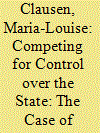

|
|
|
|
|
| Summary/Abstract |
This article argues that the current conflict in Yemen is better understood as a competition over who controls the state, rather than as a conflict between the state and a non-state actor. It traces the development of the Houthis and shows how the movement managed to seize key government institutions. However, the Houthis lack internal legitimacy and have not been able to position themselves as a nationally relevant political elite. The fragmentation of the Yemeni state has resulted in a shift to more localized struggles over access to resources and power that involve both internal and external actors.
|
|
|
|
|
|
|
|
|
|
|
|
|
|
|
|
| 3 |
ID:
159361
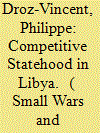

|
|
|
|
|
| Summary/Abstract |
Libya in 2011 witnessed a real process of political change, though different from all the policy-oriented jargon equating transition with a teleological transition to democracy. Due to the resilience of the Qadhafi regime in power and with the essential role of NATO intervention, the process was eased out by a eight-month civil war. Governance in post-Qadhafi Libya was not done through the rebuilding of centralized authorities. But it took the specific form of the emergence of multiple non-state actors embedded in local dynamics and then connected with weakened central authorities that had access to the huge Libyan resources. That raised complex questions about the quality of this mode of governance, especially at a time of pressing problems for Libya and its neighbors, whether direct ones (Tunisia, Egypt, Mali) or farther countries across the Mediterranean sea: terrorism with the expansion of Da’esh into the country and flows of refugees crossing Libya’s uncontrolled borders and flowing into Italy and then Europe by thousands.
|
|
|
|
|
|
|
|
|
|
|
|
|
|
|
|
| 4 |
ID:
159367
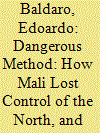

|
|
|
|
|
| Summary/Abstract |
This article analyses changes and failures in the northern Mali system of security governance, taking into account the period running from the declaration of the Malian Third Republic (1992) to the present. Considering northern Mali as an area of limited statehood, the article develops a comparative diachronic analysis, distinguishing between three phases, namely Militiarisation (1992–2002), Fragmentation (2002–2012) and Multiplication (2013–ongoing). For every phase the focus is on (1) the mechanisms of coordination among actors, (2) the distribution of coercive capacities and ruling power and (3) the forms of authority. Unintended consequences and collective problems are highlighted, in order to understand the current situation of insecurity in the area.
|
|
|
|
|
|
|
|
|
|
|
|
|
|
|
|
| 5 |
ID:
159359
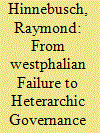

|
|
|
|
|
| Summary/Abstract |
The problematic export of the Westphalian system to MENA is examined, taking Syria as exemplar. The export model is juxtaposed to actual non-lineal trajectories, semi-sovereignty and hybrid or failing states. This is manifested in post-uprising Syria in failing statehood, fragmented and overlapping governance, permeable and collapsing borders, the loss of sovereignty to trans-state movements, “competitive regime-building” between the Asad regime and jihadist warlords, and “competitive interventionism” by external powers filling the governance vacuum with their own proxies. The result is heterarchic zones of limited statehood in which state sovereignty is contested by both international (supra-state) penetration and sub-state fragmentation.
|
|
|
|
|
|
|
|
|
|
|
|
|
|
|
|
| 6 |
ID:
159364
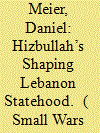

|
|
|
|
|
| Summary/Abstract |
Since the end of the civil war in 1990, the Lebanese second Republic has experienced a dual security governance in the southern borderland region. Up to the Syrian military withdrawal in 2005, the territorial and functional ‘areas of limited statehood’ between the State and Hizbullah worked as a cooperation. After the Syrian withdrawal, various forms of cooperation appeared, raising the theoretical interest for the ‘mediated state’ framework. It is conceptualizing the cooperation between the state and the non-state actor as an interdependency – with case study ranging from the marking of the Blue Line to the struggle against the jihadists groups.
|
|
|
|
|
|
|
|
|
|
|
|
|
|
|
|
| 7 |
ID:
159358
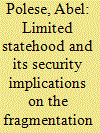

|
|
|
|
|
| Summary/Abstract |
The domestic dimension of sovereignty, or statehood, can take a number of shapes within a continuum punctuated by different degrees of state’s capacities. Stephen Krasner and Thomas Risse conceptualize statehood as the effective domestic dimension of sovereignty,1
1. Krasner and Risse, “External Actors.”
View all notes
thereby referring to the organization of public authority within a state and its level of effective control.
|
|
|
|
|
|
|
|
|
|
|
|
|
|
|
|
| 8 |
ID:
159365
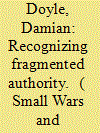

|
|
|
|
|
| Summary/Abstract |
The rollback of Daesh’s territorial control during 2017 has (re-)established an area of limited statehood in large parts of Iraq that may endure for many years. The government of Iraq projects its authority into a large geographical and political space that it shares with a multitude of other state, non-state and hybrid actors, competing and collaborating to achieve advantageous security and political outcomes. This paper examines the heterarchy of actors in post-Daesh Iraq to develop a typology and start a critical discussion about post-Westphalian alternatives for security governance in Iraq during the coming period of reconstruction and reconciliation.
|
|
|
|
|
|
|
|
|
|
|
|
|
|
|
|
| 9 |
ID:
159363


|
|
|
|
|
| Summary/Abstract |
Post-interventionist security assistance is premised on non-normative security understandings and flexible arrangements between external and local actors. In hybrid political regimes or areas of limited statehood, these forms of assistance, while strengthening specific aspects of a country’s security context, reinforce some domestic actors vis-à-vis others thanks to processes of selective borrowing by local political elites. This paper demonstrates how such processes contribute to the proliferation of hybrid elements in the country’s security sector. In two contrasting case studies, we illustrate how security assistance packages in Lebanon and Tunisia have diluted emerging democratic reforms, producing more coercive manifestation of state power.
|
|
|
|
|
|
|
|
|
|
|
|
|
|
|
|
| 10 |
ID:
159360
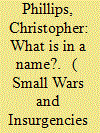

|
|
|
|
|
| Summary/Abstract |
Post-uprisings Middle East politics is frequently described as a ‘regional cold war’ involving proxy warfare that emphasises the role of shared identities linking external and local actors. But does the ‘content’ of identities impact proxy war dynamics? This article considers the present ‘battle for Syria’, a local conflict that became a theatre for multiple proxy wars involving actors emphasising identities on various levels, most notably national, religious/ sect and ethnic. It suggests that identity content does matter, with global powers more reluctant than regional players to back groups identifying at sub-national level, while foreign non-state actors are enthusiastic backers of sub-national identity.
|
|
|
|
|
|
|
|
|
|
|
|
|
|
|
|
|
|
|
|
|